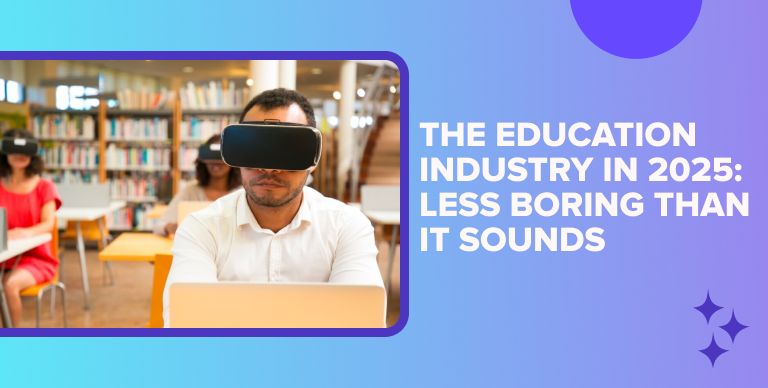Introduction
The education industry is on the brink of a major transformation in 2025. As classrooms evolve from traditional lecture halls to tech-driven hubs of innovation, the way we teach and learn is undergoing a massive shift. From virtual reality headsets to global collaboration platforms, education is becoming more exciting, inclusive, and accessible than ever before.
But it’s not all smooth sailing. With great change comes great challenges, from bridging the digital divide to addressing teacher burnout. Let’s explore the trends and issues shaping the future of education.
What’s Trending in Education for 2025?
- EdTech Revolution
Chalkboards are becoming relics of the past as technology takes over. Smartboards, VR simulations, and AI-driven platforms are becoming standard tools in modern classrooms. These innovations allow students to explore complex concepts—like anatomy or astronomy—in interactive and engaging ways. - Skills-Based Learning
Employers are shifting their focus from grades to practical skills. Critical thinking, collaboration, and problem-solving are now prioritized over rote memorization. As a result, schools are introducing project-based learning and micro-credentials to better prepare students for the workforce. - Global Collaboration
Thanks to platforms like Zoom and Google Classroom, students are connecting with peers from across the globe. Imagine Australian students collaborating on projects with their counterparts in Argentina—education is becoming a truly global experience.
Challenges Nobody Likes to Talk About
- Equity in Technology
Not all schools can afford the latest gadgets. Rural and underfunded schools risk falling behind as the gap between the haves and have-nots widens. Bridging this divide is a critical priority for policymakers. - Teacher Burnout
With growing responsibilities, limited resources, and increasing demands for tech-savviness, teachers are under more pressure than ever. Mental health support and fair compensation are urgently needed to retain skilled educators. - Privacy Concerns
As more tech enters classrooms, the collection and storage of student data raise questions about security and ethics. Safeguarding this data is vital to maintaining trust in these new systems.
Predictions for the Future
- Micro-Credentials on the Rise
Forget traditional degrees—short, focused certifications in fields like coding or design are becoming the new standard. These micro-credentials allow students to continuously upskill in a rapidly changing job market. - AI-Powered Classrooms
AI tools will become integral to lesson planning, grading, and even personalized tutoring. However, they’ll work alongside teachers, not replace them. - Hybrid Learning Models
Blended learning, combining in-person and online instruction, is here to stay. This model offers flexibility for students and teachers alike.
Conclusion
The education industry in 2025 is a blend of innovation, opportunity, and challenge. While technology is opening doors to exciting possibilities, it’s crucial to address the inequalities and pressures that come with it. As we look to the future, one thing is clear: education will never be boring again.





